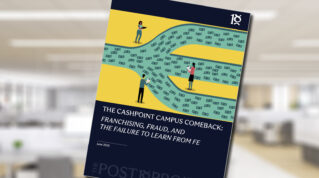Rishi Sunak recently announced a crackdown on ‘rip-off’ degrees, aimed at studies that don’t lead graduates to gainful employment. Predictably, this seems to be targeting what have historically been lauded as ‘Mickey Mouse’ degrees e.g., the social sciences and humanities. But the real ‘low-value’ degrees may in fact be in STEM.
Non-continuation rates for computer science (9.8 per cent) and engineering and technology (7.2 per cent) suggest they are not delivering for students – this is coming at the same time as the government has been vocal about its new drive to make the UK a tech superpower, announcing huge funding in different areas of the tech sector.
The spring budget included huge funding boosts in various parts of the industry, and there is clearly a real push from the government to enhance the technology skills of our workforce.
But scaring people away from humanities degrees is unlikely to deliver that. What we need are viable routes into the sector – and STEM degrees may not be providing that right now.
More people than ever are taking STEM courses now, with acceptances into computer science courses rising by almost 50 per cent. But in spite of this rise over the past decade, skilled workers aren’t entering the workforce fast enough and the UK Government lists programming, software development, IT and communications, IT business analysis and system design as the most in demand skills needed right now.
The needs of the workforce are shifting – STEM jobs used to stringently require a relevant degree, this isn’t always the case now. Some have shifted to a degree in any subject, whereas others may not need one at all. Tech giant IBM has dropped from around 80% of their jobs advertised requiring one, to around half.
University has traditionally been the default option for school leavers, which is part of the problem. There hasn’t been enough investment or awareness of other viable options, and the key policy concern should surely be to ensure there are a diversity of suitable routes for students to go on and get skilled work.
STEM jobs used to stringently require a relevant degree; this isn’t always the case now
The universities sector has work to do on that front, for example by increasing the number of courses with an industrial placement. But AI is a perfect example of how technology can completely transform our professional and personal lives in a few short months. With its rapid acceleration, a three or four-year degree seems increasingly unlikely to satisfy either the learners’ or businesses’ needs.
Work is already happening that reflects this change. Just recently, Microsoft partnered with Milton Keynes College and others in Buckinghamshire to design a curriculum which focused on areas where it felt there was a “large skill gap”, including courses in software development, programming, digital marketing and game development. It will also reportedly cost almost £10,000 less than a traditional degree, but with equal qualifications.
Degree-level apprenticeships and partnerships between universities, colleges and industry professionals show education is responding. Students are increasingly leaning toward earn-as-you-learn apprenticeships and boot camps as much better value for money.
But a lot more needs to be done to deliver on the government’s ambition, and it is more involved than simply giving money to sectors in the hope that they will find and develop their own talent pipelines. We need more relevant apprenticeship standards, and more capacity to deliver them.
Our own academy took in 65 per cent of its learners from non-STEM degree backgrounds last year, and many of our junior consultants have gone on to forge very successful careers in tech over the years, in many different types of roles within the industry.
In the wake of this degree cap announcement, the next step we need from the government is a clear plan for upskilling and training in the UK. They need to help target these pain points where students are being failed by supporting these alternative pathways; young people and the country deserve more.
This needs to be done with the cooperation of colleges, training providers and academies who are central to this – failing to acknowledge that would just amount to policy making for the sake of policy making.
















Your thoughts